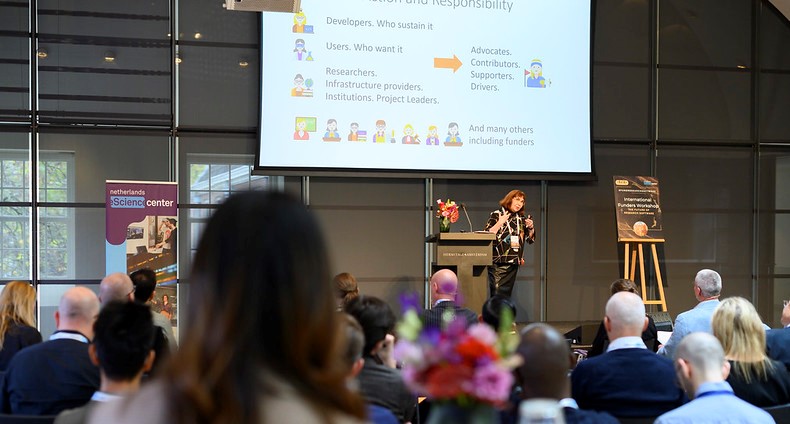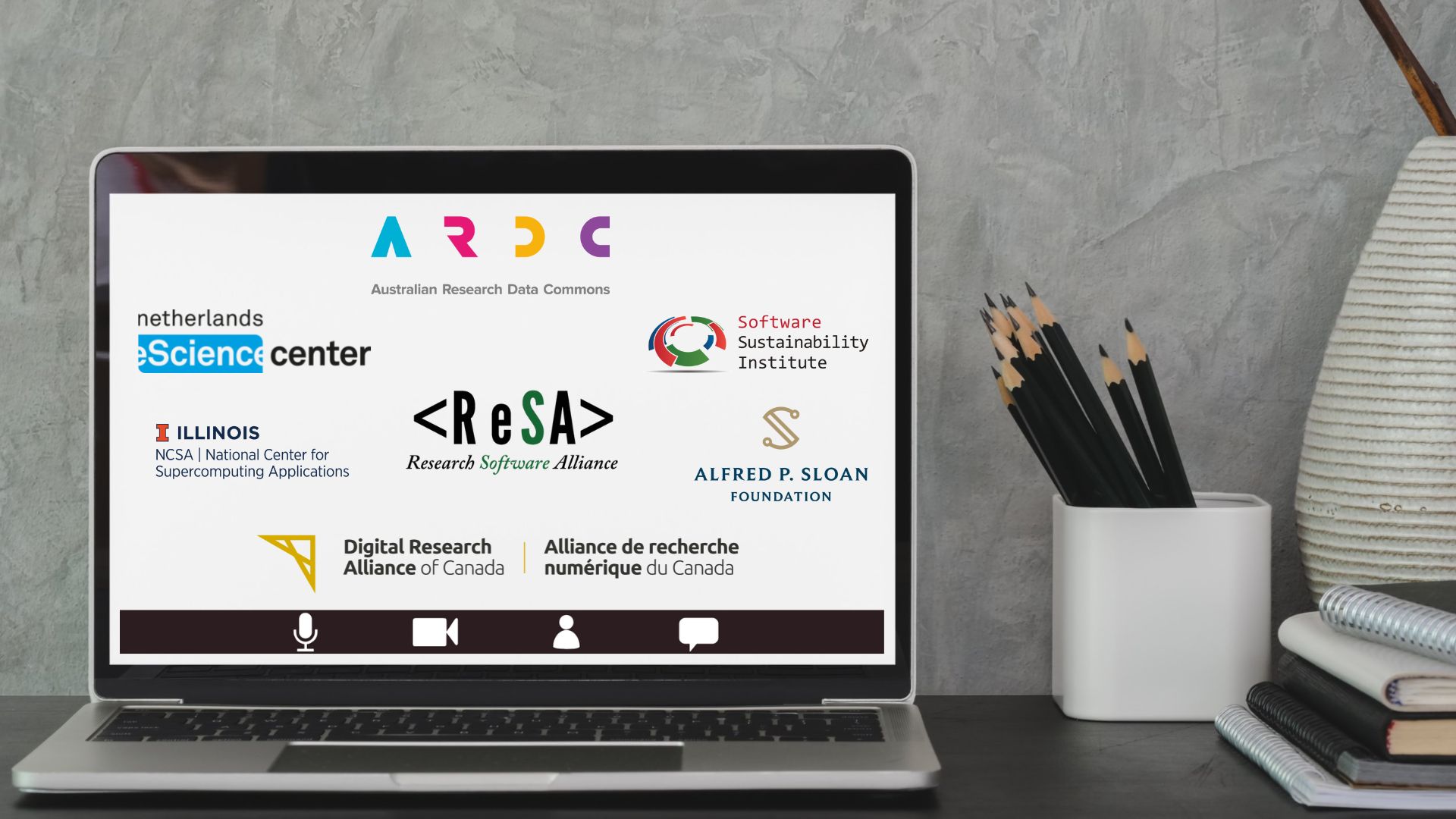RSE Worldwide: Opportunities to Strengthen the Global RSE Community
 Image credit: Viri Gutiérrez, Lummi
Image credit: Viri Gutiérrez, Lummi
By Michelle Barker, Sandra Gesing, Rowland Mosbergen, Uwe Schmitt, Carlos Martinez-Ortiz
September 2024
The RSE Worldwide sessions at this year’s Research Software Engineering Conference (RSECon) in the UK continue to address the importance of connecting these emerging communities with the global research software community. The RSE community continues to grow globally, with numerous regional and national conferences and associations. While there are established networks in many parts of the world, there are still regions where research software engineering happens without structured support. Each community brings unique regional and cultural contexts, and while challenges differ, the lessons learned in one area can be invaluable to others.
The annual sessions at RSECon offer a platform for members of the diverse global RSE community to meet, network, and share experiences. They aim to support emerging communities by leveraging the knowledge of established networks while promoting international coordination and cooperation. These sessions also seek to counteract potential siloes by discussing ways to foster strong local communities while maintaining global engagement and collaboration.
A list of resources on how to create an RSE group (within an organisation) or association (national, etc) has been compiled by the Research Software Alliance (ReSA) to collate existing advice, some of which are also collated in resources such as RSE Groups in the UK; Origins, Organisational Context, and Practices - ‘RSE Roadtrip’ Planning Document by Kim Martin, CommuneRS: A Community of Research Software Communities by Ella Kaye et al., ADORE.software toolkit by ReSA, and RSE Resources by US-RSE. Contributions to the Resources on how to create an RSE group (within an organisation) or association (national, etc) are welcome either as comments in the document itself, or by emailing info@researchsoft.org.
The RSE Worldwide sessions commenced with a keynote by Sandra Gesing on US-RSE followed by lightning talks by international community members, with highlights as follows (and see the collaborative notes for more details and a link to the slides):
- Africa: RSSE Africa (Anelda van der Walt): RSSE Africa is making strides in community engagement and has launched a bilingual newsletter. They are actively seeking French-language RSE training material to include in the French version of the newsletter. On International RSE Day they will relaunch monthly community meetups, this time partnering with RSE Asia, the African Reproducibility Network, and ReSA to optimise investment, networking opportunities, and community building. They encourage international RSEs with African collaborations to share news about RSSE Africa and the monthly meetups with their African partners.
- Asia: RSE Asia Association (Jyoti Bhogal): RSE Asia has 90+ community members and the co-founders have recently successfully completed the Community Engagement Fundamentals certification by CSCCE. RSE Asia has also joined forces with RSSE Africa to deliver a monthly webinar session on Open Science and Research Software. RSE Asia has been successful in running three annual unconferences with RSE AU-NZ since 2022. Sustaining the community is a struggle, as there is a lack of continuous funding.
- Australia & New Zealand: RSE AU-NZ (Rowland Mosbergen): The RSE AU-NZ community has grown to 479 members and is preparing for the RSE Asia-Australia (RSEAA) 2024 event, representing 22 countries.
- Belgium: be-RSE (Alexander Botzki): Linked with VIB, ELIXIR Belgium, and KU Leuven, be-RSE is organising its RSE Day event on December 6, 2024, in Brussels, bringing together the Belgian RSE community. Currently, VIB, ELIXIR Belgium, imec, the Flemish Supercomputer Center VSC, and KU Leuven are actively supporting their internal RSE communities, eager to join forces to re-establish meetups and online meetings on the regional and national level.
- Canadian Research Software Community (Qian Zhang): A young community, established just four months ago with 160+ active membership via two communication channels (Slack and mailing list), which engages with key initiatives such as the National Software Management Plan for both funders and software developers/users.
- Germany: de-RSE (Jan Linxweiler, Frank Löffler): From its beginnings in 2016 as just an email list, de-RSE became official non-profit association in 2018 and is now an established community with national recognition, networks with funders and research institutions, is integrated into national RDM efforts, helps to publish position papers on RSE topics, fosters local RSE chapters, and hosts regular conferences.
- Netherlands: NL-RSE (Carlos Martinez Ortiz): NL-RSE organises regular meetups, on different topics (technical, organisational and networking). NL-RSE have a mailing list and use the #netherlands channel in the UK-RSE slack (although not very active). Their greatest challenge is reaching RSEs in universities (especially when they do RSE work but do not call themselves RSEs). They were recently involved in the National Research Software Day event and had a very good response from the community.
- Nordic-RSE (Samantha Wittke): Starting from first informal chats in 2018, Nordic-RSE became an officially registered association in Finland in 2021 (including Nordics and Baltics). Nordic-RSE organised a successful first in-person conference in May 2024 and has a weekly open coffee chat in addition to biweekly meetings. Their main communication channel is the Zulip chat, which is shared with CodeRefinery.
- Switzerland: Swiss RSE (Uwe Schmitt): Volunteers from the Scientific IT Services of ETH Zurich started community building in late 2023 and secured two years of funding 1.5 FTE from the ETH domain ORD programme across six institutes from the ETH domain. Other Swiss academic institutions have already expressed interest in joining the community. In addition to organising meetups and online calls, the initiative also established a website (https://rse.ethz.ch), a mailing list, and a matrix space to increase visibility and facilitate communications.
- US: US-RSE (Sandra Gesing): US-RSE has grown from 20 members in 2018 to over 2700 in 2024. US-RSE is a grass-root organisation that supports RSEs through several initiatives: resources, community-building activities such as over 12 working groups, community calls, and the annual conference - USRSE’24 comes up in October 2024 - and initiatives like the awards and the US-RSE Community Fund. Currently, US-RSE is setting up an organisational membership model with organisations being able to join as founding members for life. The organisation’s future plans include securing more funding to benefit the community, to support volunteers, and to invest in creating sustainable career paths for RSEs.
Participants engaged in discussions around key topics such as building RSE communities, and ensuring volunteer sustainability; and established communities shared strategies for securing funding and organisational support. ReSA also shared updates on its activities, including the scoping of an international research software conference. This session highlighted the need for continued collaboration and international engagement to support both emerging and established RSE groups worldwide.






